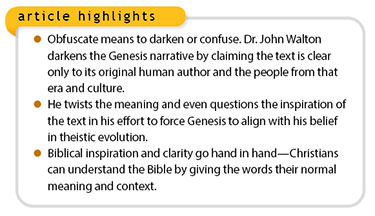 “Now, that was as clear as mud!” is an exclamation we’ve heard before. We picture a frustrated person having just heard a convoluted account where, despite their best efforts, they can’t figure out what a speaker is trying to say. We chalk such episodes up as the unintentional consequence of the speaker’s hasty thinking or a lack of experience in communicating.
“Now, that was as clear as mud!” is an exclamation we’ve heard before. We picture a frustrated person having just heard a convoluted account where, despite their best efforts, they can’t figure out what a speaker is trying to say. We chalk such episodes up as the unintentional consequence of the speaker’s hasty thinking or a lack of experience in communicating.
But how do we explain the experience where our clear understanding of a topic has been thoroughly muddied by the end of a talk or a book? Christians who have read some of The Lost World series of books by Dr. John Walton of Wheaton College have complained to me that, in effect, their formerly clear understanding of Genesis has now been turned to mud.1 These are only anecdotal accounts. I would never imply they can be extrapolated to a generalization of everyone’s experience with Walton’s materials. But I’ve heard enough from some very thoughtful people that I needed to read Walton’s material to see why it’s having this effect on some people.
The explanations of Genesis contained in Walton’s writings, in my view, constitute a classic illustration of the practice of obfuscation. Pronouncing that word leaves someone a bit tongue-tied. That’s altogether fitting. The result of a concept being obfuscated for someone is that their understanding of it has also been tied up in knots. Merriam-Webster says the verb obfuscate means “to throw into shadow: darken.” It adds that the word is related to “obscure” and that obfuscation is a practice of being “evasive, unclear, or confusing.”2 In Walton’s case, his accounts obscure or distort the meaning of the words in Genesis away from how they would normally be understood in common usage. He does this first by his claims that the intended meaning of Genesis cannot ever truly be known by anyone except the original author, and second through his habitual use of ambiguous language.
In addition, Walton does not teach that Christians can reliably arrive at a correct biblical interpretation by giving the words their normal meaning in their normal context. He insists that outside information supplied by historians or scientists is essential. Thus, his teaching is contrary to the doctrine of biblical clarity.
Obfuscation can be unintentional such as coming from a confused child or intentional such as with a criminal trying to thwart the police with a bewildering alibi. Does Dr. Walton intend to obscure the normal understanding of the historical accounts in Genesis to make them compatible with today’s consensus of evolutionary thought? Only the Lord Jesus knows his intentions.
However, looking strictly at outcomes, we ask: Is the intended meaning of Genesis obscured by Walton’s writings? Yes, it is. Using Walton’s approach, Genesis is now compatible with his belief in theistic evolution. We’ll review a few examples of how that happens and why Walton’s conclusions are incompatible with biblical Christian faith.
Walton Obscures Genesis with Professional Jargon
 Explanations that are chock-full of professional jargon—uncommon words that most people don’t know—are a powerful means of obfuscation. Even though laypeople may not fully understand what a professional person says, for many of them jargon sounds both impressive and intimidating. So, they tend not to question what a professional says and, by faith, defer to their expertise.
Explanations that are chock-full of professional jargon—uncommon words that most people don’t know—are a powerful means of obfuscation. Even though laypeople may not fully understand what a professional person says, for many of them jargon sounds both impressive and intimidating. So, they tend not to question what a professional says and, by faith, defer to their expertise.
In Walton’s case, his professional jargon consists of his appeal to the ancient writings of Near Eastern people groups that supposedly lived contemporaneously with biblical writers. For Walton these writings (and his interpretations) are extremely important. When introducing The Lost World of Adam and Eve, he explains, “In recent decades, the availability of documents from the ancient world has provided a remarkable resource for our reading of the biblical text. We dare not neglect these tools when they can contribute so significantly to our interpretation.”3 Most people cannot read or access Near Eastern writings. That’s why it’s a “lost world” that’s opened to them by faith in Walton’s beliefs about the meaning of these ancient documents. Thus, much of what Walton discusses is another form of jargon to most readers.
Walton seeks to get into the mind of writers of ancient Near Eastern literature. To him, this is an essential tool to get into the mind of biblical writers. Walton adds, “Biblical authority is tied inseparably to the author’s intention. God vested his authority in a human author, so we must consider what the human author intended to communicate, if we want to understand God’s message….We must understand how the ancients thought and what ideas underlay their communications.”4
For Walton, what a biblical author intended to write isn’t determined by the words they wrote. The discovery of this lost world enables him to present his version of why it is that biblical writers wrote things that are often so contrary to what Walton now believes the writers were actually thinking. Bible passages become less clear. Why? Because Walton’s new conclusions are often the exact opposite of what readers might conclude for themselves when taking the Bible at face value. But when readers insert a vital interpretive filter between themselves and their Bible, then understanding is restored. That filter is Walton’s beliefs about the purposes for which ancient people wrote.
When readers fail to grasp the conclusions Walton derives through this obscure approach to Bible interpretation, they may tend to blame themselves as being too simple to understand his complicated thoughts. Thus, Walton’s claim to open a lost world by employing ancient literature as jargon can be used to impress lay readers while simultaneously leaving them confused.
Convoluted Explanations Characterize Key Topics
Some Christians trying to understand what Walton is trying to say end up frustrated or confused. One case in point is Walton’s convoluted explanation of his central theme. He says:
Those who take the Bible seriously believe that God has inspired the locutions (words, whether spoken or written) that the communicator has used to accomplish their joint (divine + human) illocutions (which lead to an understanding of intentions, claims, affirmations and, ultimately, meaning) but that the foundational locutions are tied to the communicator’s world. That is, God has made accommodation to the high-context communication between the implied communicators and their implied audience, so as to optimize and facilitate the transmission of meaning via an authoritative illocution. Inspiration is tied to locutions (they have their source in God); illocutions define the necessary path to meaning that can be defined as characterized by authority.5
Walton’s main idea is inherently convoluted. Even a summary describing how Bible students must mentally zigzag between different Middle Eastern ages and places is wordy. Here is my attempt: The Bible’s words and concepts are largely unintelligible to anyone living beyond the time period of individual authors unless they possess ancient writings that enable them to project their mind back to the epoch of the biblical author to discern how nearby people groups were formerly thinking in order to figure out what a biblical author was intending to say in his era so that we can properly interpret today what the author actually wrote.
Trying to convince other Christians that what they clearly read in the Bible isn’t truly clear after all is a tough sell. It takes a lot of verbiage along twisted pathways to convince Christians that they—and innumerable Christians before them—have been confused about what the Bible has said all along.
A Helpful Tool: Walton’s Reaction to a Creationist Movie
In 2017, Thomas Purifoy Jr., who produced the creationist movie Is Genesis History?, was invited to host a showing of it at Wheaton College in Illinois.6 The movie asserts that Genesis is a true historical record that anyone can understand. Prior to the showing, Dr. Walton wrote counterarguments to the movie’s conclusions. In them he plainly summarized his suppositions. These were distributed to students and are now available online.7
Walton explains why “in many ways” asking if Genesis is real history “is just the wrong question because it forces us to operate with our modern categories, definitions and worldview regarding what constitutes ‘history.’”7 His paper should be read in its entirety. In a few of Walton’s conclusions with his own emphatic words, he says:
- When we use the term “History,” what we are thinking about is a modern construct not known in the ancient world.
- No such thing as a historian existed in the ancient world.
- Genesis is better understood as narrative rather than as a record of historical events.
- Genesis narratives are not God’s narratives (that would require dictation theory); they are human narratives that carry God’s authority….It is not provided so that we can reconstruct the creation events addressing the scientific understanding of today or meet demands of our modern worldview. Authority is vested in the interpretation of the narrator, not in the event or in our ability to reconstruct or verify the event.
- Many believe that the genre of “history” is essentially a presentation of objective data that…takes the text’s details as if they were a series of objective data points….[However] reconstructing the event is not the pathway to truth because the target truth is not inherent in the event but in the interpretation of the event.
- Genesis narratives are interested in a deep reality that transcends events and history. Their significance is found not in their historicity but in their theology; not in what happened, or even in asserting that something did happen, but in why it happened. What was God doing?...Behind the question of whether Genesis is “real history” is a concern for the truth of Genesis. Truth is found in the narrator’s interpretation, which we accept by faith, regardless of whether or not we can reconstruct the events.7
Walton’s Conclusions Are Contrary to Biblical Christian Faith
One doesn’t need access to Near Eastern literature to engage Walton’s propositions. We should resist the temptation to want to jump into his arena to wrestle with him. First, we do not want to surrender the power of starting with a biblical position. Walton’s conclusions are false at face value, as the Bible itself demonstrates. He says that there weren’t historians in Moses’ day. Really? Moses himself was one. God repeatedly gave instructions to remember, record, and pass on history to future generations. For instance, “these are the journeys of the children of Israel, who went out of the land of Egypt by their armies under the hand of Moses and Aaron. Now Moses wrote down the starting points of their journeys at the command of the LORD. And these are their journeys” (Numbers 33:1-2).
Second, as you read the Bible, ask yourself: Are our spiritual ancestors really that different from us? Not really. We find their worries, reliefs, joys, fears, and most of their thoughts are just like ours today…that’s why we can identify with them.
Walton’s teaching is contrary to what I learned as a student at Moody Bible Institute. I was taught that the biblical writers were controlled by the Holy Spirit during writing. This truth is termed biblical inspiration, and this doctrine has both breadth and depth. This meant that inspiration encompasses all the canonical books of the Bible and extends down to the words themselves.
I was instructed at this level of detail because some people were claiming that they held to inspiration but that inspiration applied only to the concepts taught in Scripture and not the words. People who want the Bible to say whatever they would like it to say don’t seem to ever want words to have their normal contextual meaning. Walton’s view that the historical accounts recorded in Genesis may not have even occurred is not just a deviation from someone’s traditions, as he claims, but is contrary to the doctrines of inspiration, inerrancy, and clarity.
The Institute for Creation Research’s position is that the doctrines of inspiration and clarity go hand in hand.8 We teach that Christians can reliably arrive at a correct biblical interpretation by giving the words their normal meaning in their normal context. Outside information may be helpful, but it’s not essential for interpretation.
Our Christian ancestors had many solid theologians and good doctrine long before Walton’s “lost worlds” were discovered. We believe in educating others that the sharp differences between ICR and some other organizations are not strictly over science or inspiration but over biblical clarity.
References
- Walton, J. H. 2009. The Lost World of Genesis One: Ancient Cosmology and the Origins Debate. Downers Grove, IL: Intervarsity Press; Walton, J. H. 2013. The Lost World of Scripture: Ancient Literary Culture and Biblical Authority. Downers Grove, IL: Intervarsity Press; Walton, J. H. and D. B. Sandy. 2015. The Lost World of Adam and Eve: Genesis 2–3 and the Human Origins Debate. Downers Grove, IL: Intervarsity Press; Walton, J. H. and T. Longman III. 2018. The Lost World of the Flood: Mythology, Theology, and the Deluge Debate. Downers Grove, IL: Intervarsity Press.
- Obfuscate. Merriam-Webster Dictionary. Posted on merriam-webster.com.
- Walton and Sandy, The Lost World of Adam and Eve, 12.
- Ibid, 15.
- Ibid, 17.
- Purifoy, T. How did Theistic Evolution Bring 3 Wheaton College Students to the Ark? Is Genesis History? Posted on isgenesishistory.com, accessed May 3, 2021.
- Walton, J. Is Genesis Real History? Posted on isgenesishistory.com.
- Guliuzza, R. J. 2018. Engineered Adaptability: The Need for Biblical Clarity. Acts & Facts. 47 (8): 17-19. See also Tomkins, J. P. 2020. Walton’s Cosmic Temple Is a House of Cards. Acts & Facts. 49 (7): 16-19.
* Dr. Guliuzza is President of the Institute for Creation Research. He earned his M.D. from the University of Minnesota, his Master of Public Health from Harvard University, and served in the U.S. Air Force as 28th Bomb Wing Flight Surgeon and Chief of Aerospace Medicine. Dr. Guliuzza is also a registered Professional Engineer and holds a B.A. in theology from Moody Bible Institute.













